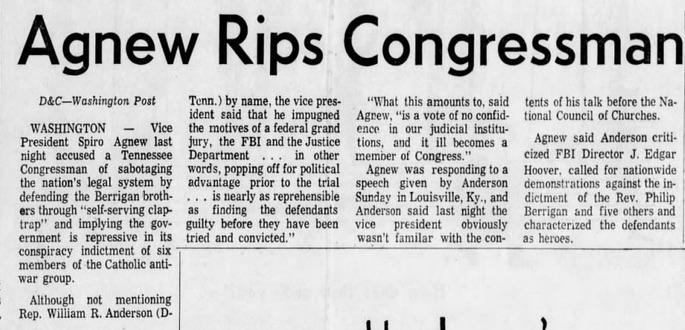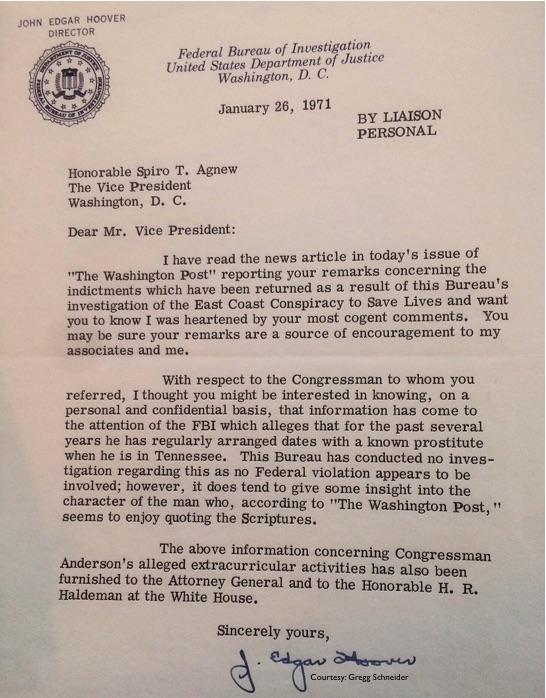A private letter from J. Edgar Hoover to Spiro Agnew in 1971 recently discovered in the disgraced vice president's personal papers shows how the FBI director leaked scandalous (but likely false) information to damage a politician who opposed him.
The Hoover-Agnew letter obtained exclusively by Lead Stories is just one in a trove of historical documents obtained by collector Gregg Schneider in a purchase from Agnew's heirs. (See the full letter below.)
The historical discovery resonates now as Democrats accuse the current FBI Director James Comey of interfering on the 2016 presidential race by sending a letter to congressional leaders indicating new evidence in the Hillary Clinton email probe less than two weeks before the November 8 election.
Just as with the Comey letter, the contents of the Hoover letter found their way into newspapers and apparently influenced the outcome of an election.
Read Also: History Uncovered: Secret Letter Shows How Presidency Can Profit Friends
The 1971 target of the FBI leak was Rep. William Anderson, who represented a representative of a conservative rural Tennessee district. Hoover was retaliating for a speech he gave criticizing the criminal indictments of a group of anti-war protesters known as the "East Coast Conspiracy to Save Lives."
Anderson was a U.S. Navy hero before he was his election to congress as a Democrat. President Dwight Eisenhower awarded him the Legion of Merit for steering the submarine Nautilus on a voyage across the North Pole in 1958, a feat that boosted Cold War American spirits after the Soviets' Sputnik satellite launch.
Although a longtime supporter of the Vietnam War, Anderson rebuked Hoover on the House floor and in a speech to a religious group in January 1971 for accusing two well-known anti-war protesters of plotting to kidnap a high-ranking government officials (supposedly Nixon National Security Advisor Henry Kissinger) and blow up electrical systems in Washington. It was the "climax" of "an outrageous pattern of fear and repression" using "tactics reminiscent of McCarthyism," Anderson said.
Hoover, legendary for using his massive files of dirt on U.S. citizens to hold his power as the FBI chief for 37 years, had a file on Rep. Anderson and he was quick to share it with Vice President Agnew a day after the congressman attacked him.
The leak, which the director said was "on a personal and confidential basis," was delivered in a January 26, 1971, letter to the Agnew thanking the vice president for defending the FBI against Anderson in a Washington Post interview. "What this amounts to is a vote of no confidence in our judicial institutions, and it ill becomes a member of Congress," Agnew told the Post. Hoover told Agnew he was "heartened by your most cogent comments" and his words were "a source of encouragement to my associates and me."
Then Hoover leaked the dirt on Anderson:
"With respect to the Congressman to who you referred, I thought you might be interested in knowing, on a personal and confidential basis, that information has come to the attention of the FBI which alleges that for the past several years he has regularly arranged dates with a known prostitute when he is in Tennessee."
Hoover wrote that the FBI "conducted no investigation regarding this as no Federal violation appears to be involved; however, it does tend to give some insight into the character of the man who, according to 'The Washington Post,' seems to enjoying quoting the Scriptures."
But history reveals that Hoover did order a probe of Anderson. Ronald Kessler's book The Bureau: The Secret History of the FBI "reported this: "Agents showed photos of the four-term congressman to call girls and asked them if he had used their services. A madam in Nashville thought Anderson had been a customer. On the memo reporting this, Hoover scribbled 'whoremonger."
Hoover noted to Agnew that he also shared the Anderson leak with President Nixon's Chief of Staff H. R. Haldeman and Attorney General John Mitchell.
The questionable attack on Anderson's morals found their way into Tennessee newspapers and contributed to Anderson's defeat in 1972, according to Kessler's book.
Death ended Hoover's reign over the FBI in May 1972 and Agnew resigned the vice presidency in disgrace in 1973 amid scandal.

















